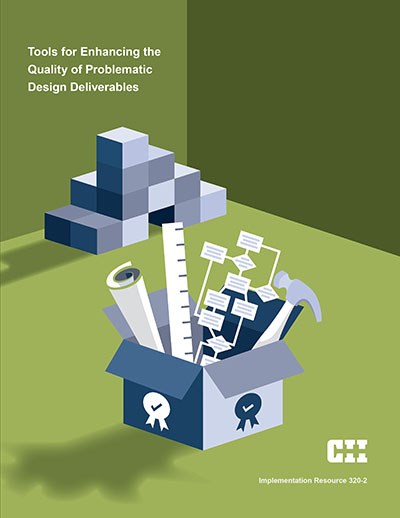
Tools for Enhancing the Quality of Problematic Design Deliverables
Publication No
IR320-2
Type
Excel spreadsheet
Publication Date
Dec 01, 2016
Pages
123
Research Team
RT-320
DOCUMENT DETAILS
Abstract
Key Findings
Filters & Tags
Abstract
Construction Industry Institute (CII) organized Research Team 320 (RT-320) to pursue this research. The research team employed a bottom-up, priority-driven approach to understanding design quality defects, impacts, causes, and leading and lagging indicators. The team began by identifying the 11 most problematic deliverables and the 73 most common and significant defects associated with these deliverables. The research team then identified 349 causal factors, which lead to the identification of 118 leading and 23 lagging metrics. With additional insight from published literature and corporate practices, the team identified 266 completeness checklist items associated with the 11 deliverables. Then, RT-320 developed two implementation tools: the Design Deliverable Quality Assessment (DDQA) tool, and the Completeness of Design Deliverable Checklist (CDDC) tool. All research products were validated with feedback from tool demonstrations and external reviewers.
Chapter 1 of this document provides an overview of research objectives, methodology, and the team members’ background information. Chapter 2 describes major findings of this research, including problematic deliverables, defects, causal factors, leading/ lagging metrics, and completeness checklist items. Chapter 3 and 4 present the objectives for the two implementation tools, and associated tool highlights, inputs, and outputs. Chapter 5 defines the roles and responsibilities of potential users and provides guidance for the timing of tool application to evaluate the completeness of deliverables. Chapter 6 summarizes the learnings from this research and future recommendations for its implementation. The appendices provide details of research findings and developments.
Key Findings
The industry survey (N=36) identified 798 common defects associated with the 11 problematic deliverables. RT-320 consolidated and aggregated these common defects, developing a list of 73 significant design deliverable defects (6.63 defects per deliverable on average). Among the 73 defects, 24 percent pertain to completeness, 60 percent pertain to correctness, and 16 percent pertain to timeliness.
RT-320 identified 349 causal factors associated with the 73 significant defects by utilizing a “5-Whys” approach. The table summarizes the defect type, impact type, and causal factors of each significant defect.
The research team:
- generated 118 leading metrics associated with the deliverable defects and causal factors.
- generated 23 lagging metrics associated with the deliverable defects and defect impacts.
- identified timing of measurement for each assessment.
Based on prior published literature, four RT company models, and RT discussions, RT-320 developed a total of 266 completeness checklist items (approximately 24 items per deliverable type, on average). This checklist can help project teams seeking a high level of completeness for their engineering deliverables.
Design Deliverable Quality Assessment (DDQA) Tool
The DDQA tool performs the following functions:
The DDQA tool performs the following functions:
- addresses the 11 most problematic deliverables
- selects the appropriate leading metrics according to user input on targeted design deliverable(s) and relevant project timing milestone(s)
- provides design quality indices for each targeted design milestone and deliverable.
- provides a list of metrics that were responded to as "NO"
- provides a list of potential defects possibly associated with metrics answered as "NO"
- facilitates documentation of path-forward corrective actions (based on project team discussions) to eliminate/mitigate potential defects.
Completeness of Design Deliverable Checklist (CDDC) Tool
The CDDC tool performs the following functions:
The CDDC tool performs the following functions:
- focuses on the 11 most problematic deliverables
- facilitates assessment of completeness checklist items pertaining to the selected deliverable(s)
- provides completeness indices for the selected deliverables
- generates a list of items not currently substantially complete, for each selected deliverable.
Filters & Tags
Knowledge Area
Best Practice
Project Phase
Project Function
Industry Group
Research Topic
Definition and Measurement of Engineering/Design Deliverable Quality
Keywords
Problematic deliverables,
Deliverable completeness,
Defect analysis,
Engineering deliverable quality,
Deliverable correctness,
Defect impacts,
Design deliverable quality,
Deliverable timeliness,
Defect causal factor,
Engineering quality,
Deliverable defects,
Leading indicators,
Design quality,
Engineering/Design defects,
Lagging indicators,
rt320



